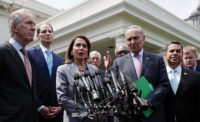President Trump's decision to shut down an announced but not yet active infrastructure advisory panel isn't expected to have a major impact on his still-unreleased proposal to add $1 trillion over 10 years for highway, rail, water, energy and other projects, industry officials say.
News of the panel's cancellation came in an Aug. 17 statement from a White House official, who said Trump had announced the closing of two higher-profile advisory bodies, the Manufacturing Council and the Strategy and Policy Forum. The statement added that the infrastructure council, "which was still being formed, will not move forward."
Some members of the other two advisory bodies had resigned in recent days, objecting to Trump's comments about protests and counterprotests in Charlottesville, Va., on Aug. 12 that turned violent, leaving one person dead and others injured.
The infrastructure panel never got off the ground. A July 17 Trump executive order created the Presidential Advisory Council on Infrastructure and was to be part of the Commerce Dept., but no members were ever appointed. New York City-based developers Richard LeFrak, CEO of LeFrak, and Steven Roth, CEO of Vornado Realty Trust, reportedly were to be its co-chairs.
According to the executive order, the panel was to provide recommendations to Trump on funding, financing and other issues for a wide range of sectors, including surface transportation, aviation, ports and energy.
Speaking of the council's demise, Barry Worthington, United States Energy Association executive director, says, "My view is that it's really not going to make a world of difference [to the investment plan] one way or the other." Worthington adds, "Its purpose was so vague and its sense of exactly what it was going to do was so vague."
Another industry source says, "I think that the infrastructure council would have been good for some press releases … and maybe to endorse or approve whatever the [administration's] staff is putting together. But from a purely practical sense, I don't think this … delays or holds up anything at all."
The Trump administration has taken action on the infrastructure front, including an Aug. 15 executive order that sets deadlines for federal agencies to complete the review and permitting of infrastructure projects. Noting that there has been some activity, the source adds, "I don't think it's happening super-fast. But it's all happening without this infrastructure council."
Construction-industry groups also have been exchanging information about infrastructure issues with the administration for many weeks, and those activities are expected to continue.
Dave Bauer, American Road & Transportation Builders Association senior vice president for government relations, said in a statement, "With all the folks in the agencies and in the White House involved with infrastructure, I don't think there is a shortage of qualified people to work on an infrastructure package."
The U.S. Dept. of Transportation declined to comment about the council. But a DOT spokesperson said via email that Secretary Elaine Chao "remains focused on rebuilding America's crumbling infrastructure and ensuring our nation has the safest, most efficient transportation system that improves the quality of life for all American people and increases the productivity and competitiveness of American workers and businesses."
Brian Turmail, an Associated General Contractors of America spokesman, said via email that the effects of the advisory panel's cancellation are hard to predict. "The best policy is developed after robust debate that includes a variety of different viewpoints," he said. "Certainly, any move that limits the range of voices participating in that conversation runs the risk of undermining that quality and, perhaps, the political viability of the administration's long-promised proposal."
Turmail added that, going forward, "we will continue to hold frequent conversations with administration officials to make sure the construction industry's voice is well represented as the White House crafts its infrastructure proposal."
That proposal remains the major focus for engineering and construction groups. Casey Dinges, American Society of Civil Engineers senior managing director for government relations, noted that ASCE has graded U.S. infrastructure a D+. He said, "With or without an infrastructure council, we urge the administration to follow through on the campaign promise to improve our nation's infrastructure."
Felicia Barnes, an attorney with the firm Hunton & Williams, however, cautions in a blog post that the executive order can only go so far. The order must be “implemented consistent with applicable law” meaning the courts and law will determine how quickly an agency can conduct a NEPA review. “It is unlikely that a majority of environmental impact statements can be issued in two years,” she adds, pointing out that a study of the 194 EISs issued in 2015, only 16 were completed in two years or less, with the average time being five years.




Post a comment to this article
Report Abusive Comment